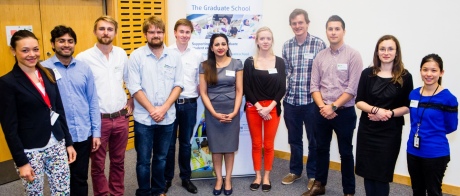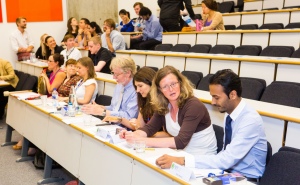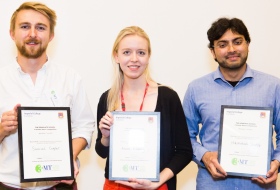The Imperial College Graduate School Three Minute Thesis Competition

Competition winner Anna Cocking (right)
Aliyah Kovner, MSc student in Science Media Production, attends Imperial's first postgraduate research showcase with a particular emphasis on brevity.
Imperial is a scientific institution well aware of the importance of public engagement and communication – indeed, it was the first in Europe to establish masters courses in science communication way back in 1991.
However, the necessity of the skill goes beyond specialists, extending to all researchers whose inventions and advancements have the potential to affect the world at large. Turning that philosophy into a fun challenge, the Graduate School hosted its first Three Minute Thesis competition this month.
 The event saw 11 PhD candidates from diverse fields delivering summaries of their thesis and its relevancy to society – all in three minutes or under. The day’s winner advanced to the UK semi-final, to be held at the University of York in July.
The event saw 11 PhD candidates from diverse fields delivering summaries of their thesis and its relevancy to society – all in three minutes or under. The day’s winner advanced to the UK semi-final, to be held at the University of York in July.
The atmosphere was dramatic for the participants, who faced instant disqualification if their talk went overtime. The alerting sound was the sonorous bang of a gong; which was demonstrated in the opening few minutes, set the stage theatrically. Host Dr Stephen Webster, Director of the Science Communication Unit, explained the strict rules of the competition, which limited contestants to one static PowerPoint slide and forbade any non-speaking forms of presentation.

The judging panel
Impressively, all the contestants finished in time. While the judges deliberated, the audience and competitors shared coffee and snacks. As anxious as they might have been to know the results, the participants were united in their respect for the competition’s message.
“You can be the best scientist in the world, but if you can’t tell anyone about it, what’s the point in doing the science in the first place, right?” said Tomasz Kostrzewski (Life Sciences), whose PhD focuses on gene activity in ‘Natural Killer’ white blood cells.
If you can’t tell anyone about it, what’s the point in doing the science in the first place
– Tomasz Kostrzewski
Department of Physics contestant James Semple gave an animated talk on creating cheaper electronics through adhesion lithography, and discussed to the difficulty of sticking to the allotted time. “I had it around 3:20, 3:30 for a long time, and even at that stage it’s really difficult to cut stuff out,” he said. As for whether he was fazed by the threat of the gong, Semple said, “I was a bit nervous beforehand, I think that’s always natural, but I’m really happy that when I was doing it, I just enjoyed it.”
Dr Webster, who was able to enjoy his tea and muffin with less stress than the eleven students, was pleased with their performances. “All the talks were very different, and showed, that there’s no one correct way to communicate science,” he said. “You need to just ask yourself some questions, think about the style you’re comfortable with and kind of follow your heart.”
 Finally, the winners were announced, with Anna Cocking (National Heart and Lung Institute) coming in first place. Her research on cell-to-cell contact through the protein E-cadherin and its impact on tumour progression was distilled eloquently in a talk entitled, ‘To stick, or not to stick’. Second place went to Sam Cooper (Materials), who discussed using tomography imaging to find the ideal micro strcuture for fuel cells. Hikmatali Shariff (Physics), placed third for the Star Wars tinged summary of his work on statistical analysis of supernovae to discover the equation state for dark energy.
Finally, the winners were announced, with Anna Cocking (National Heart and Lung Institute) coming in first place. Her research on cell-to-cell contact through the protein E-cadherin and its impact on tumour progression was distilled eloquently in a talk entitled, ‘To stick, or not to stick’. Second place went to Sam Cooper (Materials), who discussed using tomography imaging to find the ideal micro strcuture for fuel cells. Hikmatali Shariff (Physics), placed third for the Star Wars tinged summary of his work on statistical analysis of supernovae to discover the equation state for dark energy.
Director of the Graduate School Sue Gibson closed the ceremony, remarking, “I think the future is very bright for science communication. As Imperial deepens its commitment to training articulate young scientists, this was only one of many opportunities for keen students to challenge themselves.”
Until then, good luck to Miss Cocking in York.
Article text (excluding photos or graphics) © Imperial College London.
Photos and graphics subject to third party copyright used with permission or © Imperial College London.
Reporter
Press Office
Communications and Public Affairs
- Email: press.office@imperial.ac.uk
